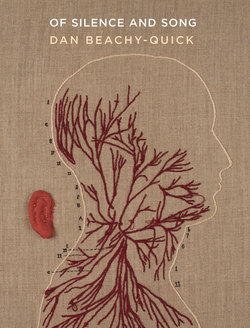Читать книгу Of Silence and Song - Dan Beachy-Quick - Страница 15
На сайте Литреса книга снята с продажи.
Оглавление5.
There must be a way to begin that doesn’t include paradise.
But maybe not.
Ezra Pound’s “Notes for Canto CXX”:
I have tried to write Paradise
Do not move
Let the wind speak
that is paradise.
Let the Gods forgive what I
have made
Let those I love try to forgive
what I have made.
I’ve gone over this poem in my mind many times. I think about the made-thing that is a poem and the making-thing that is a poet. Sometimes I’ve thought a line of verse is only a placing of words on wind, but then the wind dies down and in my mind I see the wild thrashing of the storm-tossed tree grow horribly still. Other times I’ve thought the lines of verse that make a poem are nothing more than telegraph wires carrying voices inside them; but those voices matter little, if at all, for their importance isn’t in what they say but that they say. There is no other way to write but to string them like wires taut across some distance so that the wind can blow across and sing its own song. Sometimes I think it can be heard in no other way, that song—the one you cannot sing. And then I think, you can put your ear against anything, any made-thing, and hear that supernal vibration that is paradise, I mean the wind speaking, I mean the actual poem, the un-making one, the un-made one we can only glimpse by the making of our own.
Such thoughts lead to other considerations. Place your ear gently against the page. It’s a poem about the ocean, maybe. Maybe I think I hear waves. Obscure waves.
I’m writing these words sitting inside the Houghton Library. The ocean is somewhere not far away. Next to me, propped open, Emerson’s journal from July 1847 in which he is thinking about Thoreau. Next to it, in a manila folder not yet opened, Wallace Stevens’s typescript for “Notes Toward a Supreme Fiction.”
I hope to open it before my time is up.
“HURRY UP PLEASE IT’S TIME.”
“As if you could kill time without injuring eternity.”
Emerson quotes from Thoreau: “So it remained in a degree of obscurity for me.” He’s referring to the name of a nameless place.
Emerson writes:
Henry pitched his tone very low in his love of nature,—[handwriting illegible for a few words] tortoises (?), crickets, muskrats, [illegible], toads + frogs, it was impossible to go lower. Yet it gave him every advantage in conversation: for who could tax him with transcendentalism or over-refining that found him always skilled in facts, real experiences in objects which made their objects + experiences appear artificial: and yet his position was in Nature, + he commanded all its miracles + infinitudes.
One of the things that has only grown in degrees of obscurity for me is what the fact of the poem might be. Even that grammar feels wrong. Might be? Then it’s not a fact.
Or is the possibility of the thing not yet made a fact? A fact beneath the matter of the fact, barest bound against infinitude, that says, Here in this space something can come, but the saying of such a fact is silent.
If it can be said at all.
Experience agitates itself. Eventually the fact of it appears artificial.
You keep recalling it and each time, though you cannot notice it, something changes, something alters, until perhaps the memory appeals to nothing experience means. You forget even what you’ve forgotten.
Turn the page.
Emerson quotes and reminisces for twenty-five pages and then inserts between two blank sheets a newspaper article: “Thoreau and His Writings: His Habits of Thought: Cape Cod.” The article is just a single column, but long, and folded in thirds. It opens by saying that Thoreau “addresses Spartans in taste and Spartans in life,” that he does not appeal to the sentiments of readers that have made other authors more popular. I don’t know what the rest of the article says, or if Emerson himself wrote it. I was scared that unfolding the old paper would destroy it. But what I did take note of is that clipping is followed by twelve blank pages in the journal and the next entry is a torn-out sheet of ruled notebook paper on which, in deep brown ink, Emerson wrote: “His ‘nightwarbler’ June 19 1853 seen + described.” On the backside:
1853
Feb 13. in the driving snowstorm, a dense flock of snowbirds out under the pigweed in the garden.
The torn page nesting in the blank white sheets a kind of songbird lost in the snow.
Then Emerson transcribes Thoreau’s poem “Inspiration.” The first line is: “If with light head erect I sing.” At first I think light means dizzy; then I think it means light. Behind my eyes there’s a dim glow better than the din of thought. It’s dizzying.
Let those I love try to forgive what I have made.
The rest of the journal is blank.
